Plenary speakers:
·
·
·
·
·
·
·
·
· · |
Rita Baker
 For the last twenty years Rita Baker has run the Lydbury English Centre with her husband Duncan. The Centre, situated in Shropshire on the English side of the Welsh border is very small catering for a maximum of ten participants at any one time and providing residential immersion courses in English for foreign business and professional adults. Rita started her career in teaching English in 1970 and has worked with learners of all ages. This has included four to seven year olds in The Ecole Francaise in Nairobi Kenya and the British School in Sana'a in the Yemen Arab Republic . She has also worked for the British Council and spent three and a half years as an advisory teacher for children with perceptual learning difficulties. She has been developing the Global Approach - a whole brain way of language learning - since 1989 and has been involved in teacher training and development since 1991. She and Duncan have four grown up children. For the last twenty years Rita Baker has run the Lydbury English Centre with her husband Duncan. The Centre, situated in Shropshire on the English side of the Welsh border is very small catering for a maximum of ten participants at any one time and providing residential immersion courses in English for foreign business and professional adults. Rita started her career in teaching English in 1970 and has worked with learners of all ages. This has included four to seven year olds in The Ecole Francaise in Nairobi Kenya and the British School in Sana'a in the Yemen Arab Republic . She has also worked for the British Council and spent three and a half years as an advisory teacher for children with perceptual learning difficulties. She has been developing the Global Approach - a whole brain way of language learning - since 1989 and has been involved in teacher training and development since 1991. She and Duncan have four grown up children.
PLENARY LECTURE AT THE , FRIDAY, 23 September 2005
Whose Language Is It Anyway?
Many learners of English believe that they need mainly to increase the number of 'words' they 'know'. I argue that extending the uses of a core of key words and effective strategies is more time-efficient than extending the range of vocabulary. I suggest what words and strategies are essential for effective communication in an international context and the implications of this for teaching and learning.
Craig Dicker
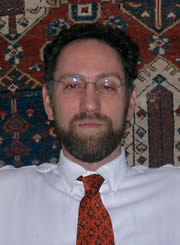 Craig Dicker is the Regional English Language Officer (RELO) for Central and Southeastern Europe based in Budapest, Hungary. He has a doctorate in language education from Columbia University in New York. Prior to arriving in Budapest, Dr. Dicker served as the Public Affairs Officer in Azerbaijan and the RELO in South Africa and Indonesia . He has also lived and worked in Yugoslavia (as a Fulbright Scholar) and Portugal (as an English teacher). Dr. Dicker speaks Azerbaijani-Turkish, Serbo-Croatian, Indonesian and French. His areas of expertise include qualitative studies of classroom
settings, content-based language instruction, models of teacher education, reading instruction and oral testing. Craig Dicker is the Regional English Language Officer (RELO) for Central and Southeastern Europe based in Budapest, Hungary. He has a doctorate in language education from Columbia University in New York. Prior to arriving in Budapest, Dr. Dicker served as the Public Affairs Officer in Azerbaijan and the RELO in South Africa and Indonesia . He has also lived and worked in Yugoslavia (as a Fulbright Scholar) and Portugal (as an English teacher). Dr. Dicker speaks Azerbaijani-Turkish, Serbo-Croatian, Indonesian and French. His areas of expertise include qualitative studies of classroom
settings, content-based language instruction, models of teacher education, reading instruction and oral testing.
PLENARY LECTURE AT THE , THURSDAY, 22 September 2005
The Realities of the Common European Framework of Reference for Languages (CEF)
The CEF presents dangers and opportunities for language educators across Europe . In this presentation, the principles of standards-referenced approaches to testing, curricula development and classroom instruction will be discussed. The implications of adopting such an approach and its impact on students and teachers will be outlined. The role the CEF can and should play in the process will be stressed.
CONCURRENT PLENARY LECTURE AT THE , SATURDAY, 24 September 2005
Four Eyes Are Better than Two
The classroom is a mysterious black box where teachers and students, behind closed doors, learn and teach. People justifiably fear their colleagues' judgmental comments. However, if trained to conduct non-judgmental, focused descriptions of classroom behaviour, peer observations can be real eye-openers. This presentation outlines how to observe and share descriptions in a non-judgmental fashion.
Šarolta Godnič Vičič
CONCURRENT PLENARY LECTURE AT THE , SATURDAY, 24 September 2005
To Blog or Not to Blog
This talk explores the ways in which "blogs," a type of web journals, help to develop writing, reading and communication skills. The potentials that blog assisted language learning offers to EFL and ESP learners are illustrated with practical examples of blogging projects around the world. As the interactive and reflective features of blogging provide opportunities for teachers' own professional development, these will also be briefly addressed.
David A. Hill
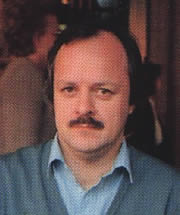 David A. Hill is a free-lance teacher, teacher trainer and materials writer working out of Budapest. He works with teachers throughout Europe and beyond, both in their own countries and on summer courses in the UK for NILE. 2005 has seen him working in Italy, Singapore, Spain, Portugal, Hungary, Bulgaria, Latvia and the Czech Republic. He has been writing materials for China, Qatar, Egypt and Italy. He is an old friend of IATEFL Slovenia having presented at the 3 rd, 7 th, 8 th, 9 th and 10 th Conferences. David A. Hill is a free-lance teacher, teacher trainer and materials writer working out of Budapest. He works with teachers throughout Europe and beyond, both in their own countries and on summer courses in the UK for NILE. 2005 has seen him working in Italy, Singapore, Spain, Portugal, Hungary, Bulgaria, Latvia and the Czech Republic. He has been writing materials for China, Qatar, Egypt and Italy. He is an old friend of IATEFL Slovenia having presented at the 3 rd, 7 th, 8 th, 9 th and 10 th Conferences.
He is on the Committee of Management of IATEFL.
PLENARY LECTURE AT THE , SATURDAY, 24 September 2005
The Challenge of the Indigo Children
If you have been teaching for the last 20 years, you may have noticed a radical change in the behaviour of the children you are now dealing with. Equally, if you have children of your own, their behaviour may be very different from that of you and your partner when you were their age. This is not just another "kids these days.!!" generational issue. It seems that we are witnessing an evolutional change in human beings. Your pupils and your own children may be Indigo Children, and, as such, require a very different style of education and upbringing to the one which we have traditionally been offering. This plenary lecture will explore these issues.
Robert Hill
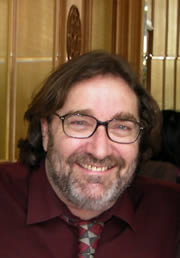 Robert Hill graduated in English Language and Literature at the University of Oxford , and has worked in Spain , Greece , England , and Italy . For many years he taught English at the University of Verona . He currently teaches at the State University of Milan and is a consultant/teacher-trainer for the Alto-Adige Province of Italy. Robert Hill graduated in English Language and Literature at the University of Oxford , and has worked in Spain , Greece , England , and Italy . For many years he taught English at the University of Verona . He currently teaches at the State University of Milan and is a consultant/teacher-trainer for the Alto-Adige Province of Italy.
He has spoken at TESOL Conferences in Italy , Spain , Dubai and Brazil . He also speaks regularly at British Council National Conferences in Italy , and has spoken at IATEFL conferences in Italy , Cyprus , Poland and the UK . For many years he has been involved in teacher training for the Italian Ministry of Education and Italian regional educational authorities, and for the British Council in Italy , Gemany and Turkey .
He has published numerous text-books and articles, including editions of Romeo and Juliet and Macbeth for the Spotlight on Shakespeare series, Black Cat-CIDEB, and The Black Cat Guide to Graded Readers .
CONCURRENT PLENARY LECTURE AT THE , SATURDAY, 24 September 2005
Reading and the Common European Framework
This session will explore the points of contact between the Common European Framework and the skill of reading: how to grade reading skills; what texts to use; how to grade texts; what is the importance of cultural content. Is the CEF exhaustive and reliable? Both graded and non-graded reading material will be used to demonstrate the CEF's strengths and weaknesses.
Simon Marshall
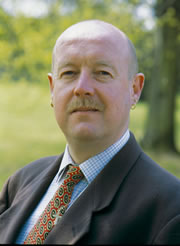 Simon Marshall teaches beginner to very advanced adult students, employing a wide range of creative and purposeful strategies and creating a relaxed, trusting and hardworking classroom atmosphere. He carried out intensive and part-time CELTA and DELTA programmes and Simon Marshall teaches beginner to very advanced adult students, employing a wide range of creative and purposeful strategies and creating a relaxed, trusting and hardworking classroom atmosphere. He carried out intensive and part-time CELTA and DELTA programmes and
He has also designed and taught a wide range of specialised teacher training courses both within the UK and overseas. He strives to bring commitment, creativity and a sense of humour to his teaching and training work. Mr Marshall is currently co-authoring a resource book for very advanced learners and is preparing further ELT materials.
CONCURRENT PLENARY LECTURE AT THE , SATURDAY, 24 September 2005
Perfectionism: The Double Edged Sword
This interactive talk will look at the positive and negative sides of perfectionism. Sadly, research indicates it is the most dedicated teachers who suffer the most. Why is this so, and ways of alleviating stress and guilt will be of central importance.
Clive Oxenden
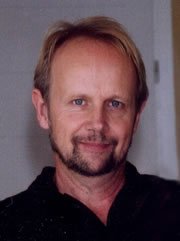 Clive Oxenden trained to teach EFL at International House, London, and later took his RSA (Cert) at Bromley College, Kent. He has taught English and trained teachers for 23 years, mainly in Spain but also in Turkey, Kuwait, Algeria, and the UK, where he was the RSA tutor at Padworth College in Berkshire. He has spent the last fifteen years teaching at the British Council, Valencia. Clive Oxenden trained to teach EFL at International House, London, and later took his RSA (Cert) at Bromley College, Kent. He has taught English and trained teachers for 23 years, mainly in Spain but also in Turkey, Kuwait, Algeria, and the UK, where he was the RSA tutor at Padworth College in Berkshire. He has spent the last fifteen years teaching at the British Council, Valencia.
Clive's most recent publication is English File , a multi-level course for Oxford University Press (with Christina Latham-Koenig and Paul Seligson).
CLOSING PLENARY LECTURE AT THE , SATURDAY, 24 September 2005
'You must remember this.' Making new language memorable (closing plenary)
One of the most important stages of a class is when we present new language to students. A good presentation should itself be memorable and help to make the target language easy to remember. To achieve this we need our students to be focused and involved, not with their heads in the book (perhaps not even looking at the right page!). This talk looks at ways of adapting and improving text book presentations to make them more effective, more relevant, more fun and above all. more memorable.
Annie Polatsek
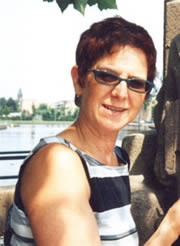 With a background in artistic endeavours, Annie Polatsek has been gliding around the globe on an English language medium - Taiwan , Japan , Pakistan , Uzbekistan , Bosnia , Albania , Indonesia and Croatia . Connecting concerns and curiosity for curriculum development, promoting critical thinking, encouraging creativity, querying learning styles and advancing alternative assessment with the philosophy that less teaching is more learning & showing, not telling, to prove it. Facilitating visions & taking alternative technology into the self-access and self-directed modes has been her veering from a decided focus on teacher training. She is currently an independent consultant with a house on Hvar and considers herself a Balkan-based gal. With a background in artistic endeavours, Annie Polatsek has been gliding around the globe on an English language medium - Taiwan , Japan , Pakistan , Uzbekistan , Bosnia , Albania , Indonesia and Croatia . Connecting concerns and curiosity for curriculum development, promoting critical thinking, encouraging creativity, querying learning styles and advancing alternative assessment with the philosophy that less teaching is more learning & showing, not telling, to prove it. Facilitating visions & taking alternative technology into the self-access and self-directed modes has been her veering from a decided focus on teacher training. She is currently an independent consultant with a house on Hvar and considers herself a Balkan-based gal.
PLENARY LECTURE AT THE , THURSDAY, 22 September 2005
Alternative Assessment: It's Not in Our Mentality
How can new ideas like self and peer evaluation be introduced into the traditional system of number grades? There is bound to be resistance, yet it can it be overcome. Through attitude surveys, creating criteria and trying it out in the region, we'll share our experiences and try to convince you to try something alternative in your own course!
Alenka Rebula
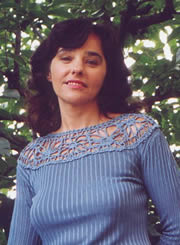 Alenka Rebula was born in 1953, is married and a mother of three. She works and lives in Trieste , Italy . She graduated from philosophy. She worked as a psychologist and as a professor of social studies for several years. At the moment she works as a professor of social sciences at the Slovene Grammar School in Trieste . During the 25 years of her career she has carried out various lectures, education and training courses, as well as workshops for teachers and parents (developmental psychology, pedagogy and didactics). Ms Rebula has also organised and conducted several intensive courses for self-education and independent studying of adults. She has written poetry, short stories, youth-oriented radio plays and created a series of educational radio programmes for adults in Italy . She also published numerous articles in the field of philosophy, psychology and psychotherapy. Alenka Rebula was born in 1953, is married and a mother of three. She works and lives in Trieste , Italy . She graduated from philosophy. She worked as a psychologist and as a professor of social studies for several years. At the moment she works as a professor of social sciences at the Slovene Grammar School in Trieste . During the 25 years of her career she has carried out various lectures, education and training courses, as well as workshops for teachers and parents (developmental psychology, pedagogy and didactics). Ms Rebula has also organised and conducted several intensive courses for self-education and independent studying of adults. She has written poetry, short stories, youth-oriented radio plays and created a series of educational radio programmes for adults in Italy . She also published numerous articles in the field of philosophy, psychology and psychotherapy.
OPENING PLENARY LECTURE AT THE , FRIDAY, 23 September 2005
The Power of the Word (opening plenary)
Words not only create mental, but even more so physical and emotional response in the learner. This plenary talk will introduce present-day perceptions of the power of the word and the inseparatibility of the thinking and feeling processes, paying special attention to the recent discoveries on the human brain. Consequently, languages can only be taught effectively if personal content is triggered in the learner and a desire to master the language as an important life skill is instilled.
Darja Žnidaršič
 Darja Žnidaršič. Year 1968. A mother; wife and teacher. 13 years of working experiences in primary school. Still teaching. Stil seaking the ways to improve quality of teaching to meet the needs of younger generation. In love with art, music and literature . Likes travelling to explore people and cultures. Admires creativity and artistic abilities. Believes in work ethic Participates in new projects and research. Involved in teaching English to young learners with >convergent< method which helps to construct intercultural competence. Believes in abilities of young students in learning English by connecting teaching method to their creative abilities. Darja Žnidaršič. Year 1968. A mother; wife and teacher. 13 years of working experiences in primary school. Still teaching. Stil seaking the ways to improve quality of teaching to meet the needs of younger generation. In love with art, music and literature . Likes travelling to explore people and cultures. Admires creativity and artistic abilities. Believes in work ethic Participates in new projects and research. Involved in teaching English to young learners with >convergent< method which helps to construct intercultural competence. Believes in abilities of young students in learning English by connecting teaching method to their creative abilities.
|

